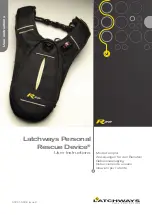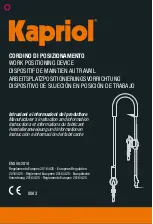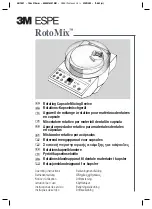
EN
- 10 -
Information for Operators
The following information is intended to assist you,
the operator, in safely working with the
Silent TS
in
your laboratory.
Using these operating instructions as a
starting point, instruct all operators of the
unit with regard to the area of application,
the possible hazards during operation, and
the proper operation of the dust extractor.
Please have these operating instructions readily
available for the operators.
A. Application Area
The
Silent TS
is a workbench extractor used to ex-
tract dusts such as occur in laboratories, e.g., dental
labs.
It is solely intended for commercial use in laboratories
and not for private, household use.
The
Silent TS
can be operated both manually as well
as in conjunction with connected, electric, dust-gener-
ating equipment.
It is possible to connect one or two suction points
to the extractor. The second suction point can be
connected with a Y-adapter which is available as an
accessory (see chapter „accessories“).
In order to protect the health of persons
working in a dental laboratory, the law re-
quires that specialised dust extractors must
be used.
National regulations state the MAK value
- maximum concentration of suspended
particles in the air.
Find out about the legal national threshold
value and the type of dust generated in
your laboratory.
A.1 Proper Use
Proper use implies the extraction of dry, non-explo-
sive dusts. Fire-promoting, easily flammable, flamma
-
ble, or explosive materials may not be extracted with
the
Silent TS
.
The extraction of liquids, smouldering, or burning
materials is prohibited.
Any other use is not „as intended“. The manufacturer
shall not be liable for any damages resulting from any
such other use.
The „use as intended“ includes compliance with the
operating, servicing and preventive maintenance
conditions defined by the manufacturer.
A.2 Ambient Conditions
(in accordance with DIN EN 61010-1)
The unit may only be operated:
• Indoors;
• Up to an altitude of 2,000 m above sea level;
• At an ambient temperature range between
5 - 40 ºC [41 - 104 ºF] *);
• At a maximum relative humidity of 80 % at 31 ºC
[87.8 ºF], dropping in a linear manner to 50 %
relative humidity at 40 ºC [104 ºF] *);
• With mains power where the voltage fluctuations
do not exceed 10 % of the nominal value;
• Under contamination level 2 conditions;
• Under over-voltage category II conditions;
*) Between 5 – 30 °C [41 – 86 °F], the unit can be operated at
a relative humidity of up to 80 %. At temperatures between
31 – 40 °C [87.8 – 104 °F], the humidity must decrease propor
-
tionally in order to ensure operational readiness (e.g., at 35 °C
[95 °F] = 65 % humidity; at 40 °C [104 °F] = 50 % humidity). The
unit may not be operated at temperatures above 40 °C [104 °F].
B. Hazard and Warning
Information
Only intended for indoor use. The unit is
only designed for dry applications and may
not be operated or stored outdoors or un-
der wet conditions.
The
Silent TS
laboratory dust extractor is an
electric device and, as such, carries with it
a certain inherent potential hazard. The unit
may not be taken into service until any re-
quired alterations to comply with regionally
specific power plug configurations have
been made. Such alterations may only be
performed by a qualified electrician.
The unit may only be operated if the infor-
mation on the nameplate conforms with the
specifications of your local mains power
supply.
The mains socket on the unit is only de-
signed for the purposes specified in the
Operating Instructions. Connecting other
devices may cause material damage. Before
connecting another device, turn off both the
dust extractor and the other device.
Read the operating instructions of the other
device and comply with the safety instruc-
tions contained in the document.
Please observe the national regulations and
permitted exposure to dust in a working
environment. Please note EN 60335-2-69,
Appendix AA, or initiate appropriate en-
quiries with your trade association or the
responsible authorities.
When extracting hazardous materials,
always refer to the relevant safety data
sheets.
Always wear protective gear when extract-
ing hazardous materials.
It is necessary to wear suitable, personal
protective equipment when emptying the
dust bag or cleaning, depending on the type
of extracted material.
Summary of Contents for 2921-0050
Page 2: ......
Page 3: ...2 3 5 6 7 8 1 4...
Page 4: ...9 10 11 12 13 14 15 16...
Page 5: ...17 18 19 20 21 22 23 24...
Page 6: ...31 25 32 26 a 28 30 27 29...
Page 116: ...PL 14...
Page 150: ...JA 12...
Page 162: ...KO 12...
Page 164: ...AR 2 1 1 1 120 170 65 1 2 1 Y 1 3 IP a 2 OFF 3 1 4 4 N D 2 1 5...
Page 170: ...AR 8 1 1 E 4 E 4 3 3 1 3 2 3 6 2 3 3 3 1 3 2 3 2 3 1 3 3 1 3 1 3 3 1 2 7 1 2 7 1 3 5 E1...
Page 171: ...AR 9 2 7 1 2 2 Silent TS 1 4 2 5 2 6 3 4 Silent TS 2 6 1 4 2 5 2 6 6 2...
Page 175: ...AR 13 I 3 Renfert 3 1000...
Page 176: ...AR 14...
Page 189: ...UK 13 Renfert 3 3 1000 Renfert...
Page 190: ...UK 14...
Page 194: ......
















































